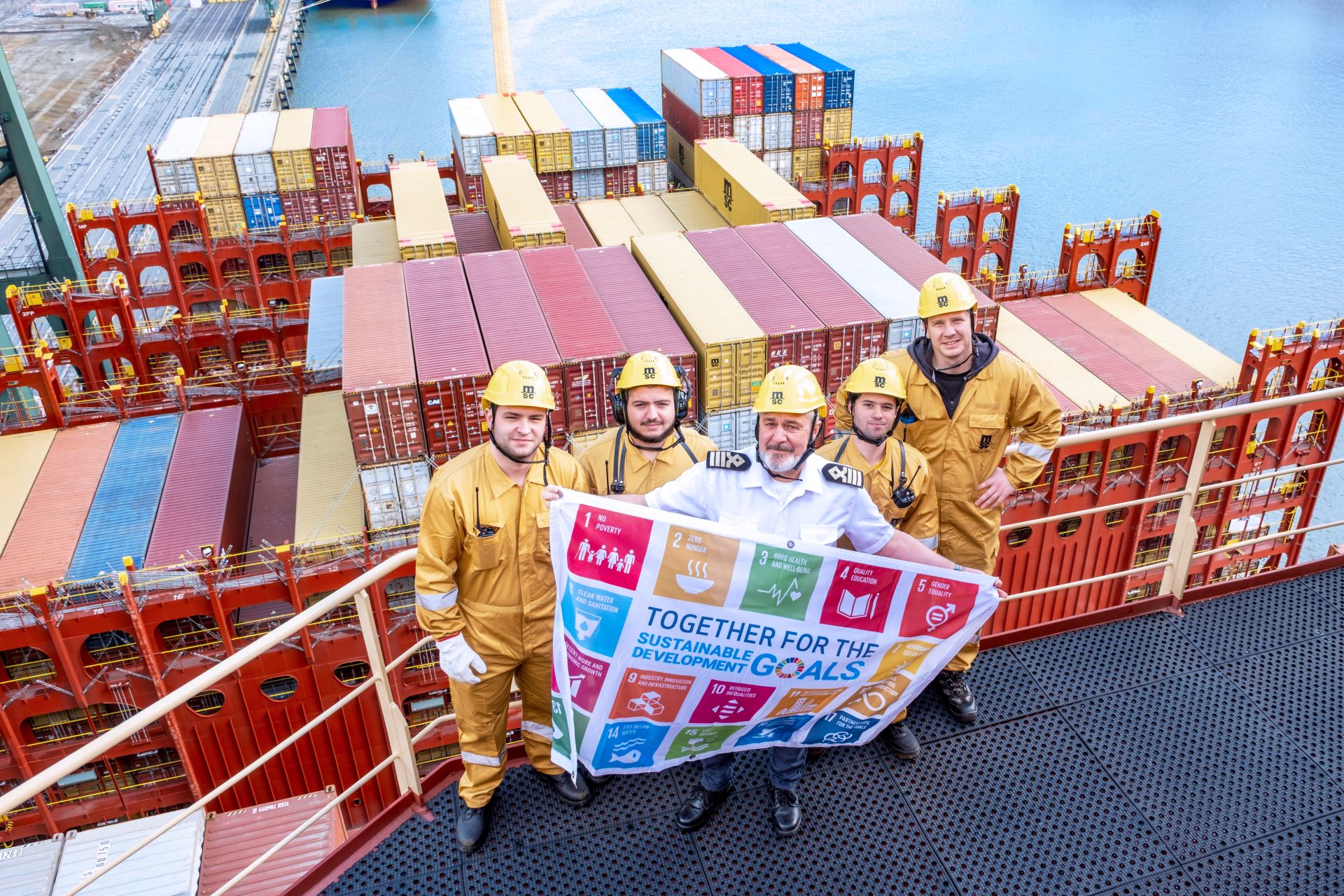
/it/newsroom/news/2024/september/two-days-one-mission-navigating-sustainability-and-safety-for-the-future

The end of September marks two important dates that highlight key imperatives for MSC: sustainability and safety.
Flying the flag
On 25 September, we joined organizations worldwide in raising the Sustainable Development Goals (SDG) flag at our Geneva headquarters to commemorate SDG Flag Day. Our sustainability roadmap was developed to directly contribute to 13 of the United Nations’ 17 SDGs, and by raising the flag, we reaffirm our ongoing commitment to these goals.
However, SDG Flag Day also reminds us that much work remains. Only 17% of SDG targets are on track, nearly half show minimal progress, and over a third have stalled or regressed. Despite these setbacks, MSC remains committed to collaborating across and beyond our sector to drive the industry towards a more sustainable future.
As an active participant in the United Nations Global Compact (UNGC) and a member of the UNGC Ocean Stewardship Coalition, MSC is committed to accelerating the transition to a sustainable ocean economy in line with the Sustainable Ocean Principles. On 23 September alongside ocean business peers – spanning shipping companies, ports, cargo owners, energy suppliers, crewing companies and others – we endorsed a joint statement coinciding with the High-Level Ocean of the Future Meeting at the 79th session of the UN General Assembly in New York.
More broadly, as part of our contribution to the SDGs, MSC is introducing over 100 new dual-fuel vessels to our fleet by end 2027, exploring partnerships to scale the use of alternative fuels, and rerouting ships to protect endangered whales. We are also rolling out electrified, hybrid or alternative zero-emission yard equipment across our terminals, expanding our landside operations to accelerate intermodality and promoting the shift from road to rail, and all the while ensuring that the economic and social benefits of global trade are maintained despite global disruptions.
World Maritime Day
The following day, 26 September, marks World Maritime Day, with this year’s theme: ‘Navigating the future: safety first!’ This serves as a timely reminder that as we transition to new technologies and fuels, crew safety must remain a top priority. We understand that innovation in sustainability must be matched by advancements in safety and supported by training programmes.
Our zero-fatality ambition is central to our approach to safety. By embedding industry-leading policies we ensure our global operations meet the highest standards, including ISO45001. We use proactive risk-management tools, such as AI powered navigational assistants that process multiple sources of information in real time, enhancing our ability to identify and evaluate complex marine traffic situations. As a result of efforts such as these, MSC Shipmanagement has seen a 45% reduction in lost time incidents involving our seafarers over the past three years.
A Just Transition
Equally importantly, we recognize that the energy transition needs to be safe, equitable and people-centric. We’ve been collaborating with stakeholders across the maritime community through the Maritime Just Transition Task Force, reflecting our commitment to supporting and preparing our seafarers for the changes ahead.
Accordingly, we place a strong emphasis on upskilling and reskilling our seafarers to meet the evolving demands of the maritime industry. Training programmes now include advanced bridge simulators to enhance decision-making and navigation capabilities. Dual-fuel engine-room simulators are also being used to prepare crews for the technical challenges related to our new vessels and the fuels and technologies used on them. Alongside these initiatives, digital learning platforms and continuous on-the-job training ensure that the MSC family remains adaptable and proficient, ready to safely operate the latest technologies and fuel systems.
As we commemorate both SDG Flag Day and World Maritime Day, these occasions serve as powerful reminders of our dual commitment to sustainability and safety. By investing in cleaner technologies and fostering a culture of safety across our global operations, we’re not just navigating the future—we’re shaping it through a just transition that balances innovation with the safety of our people.